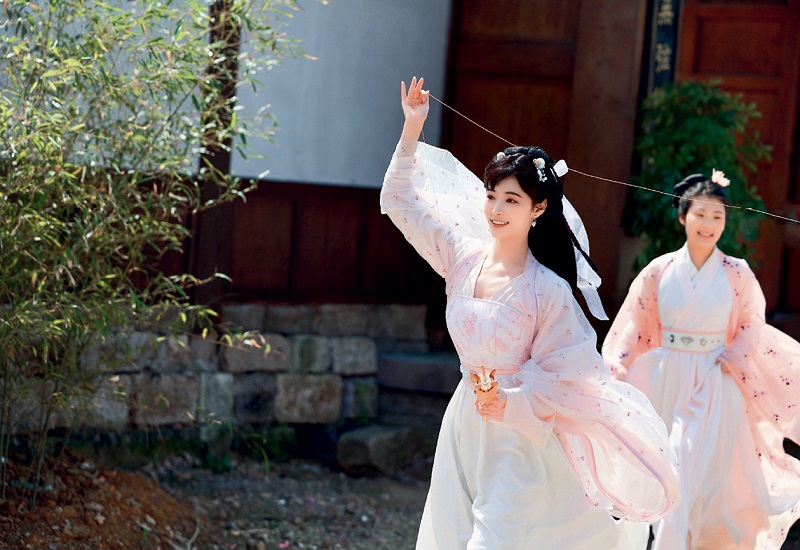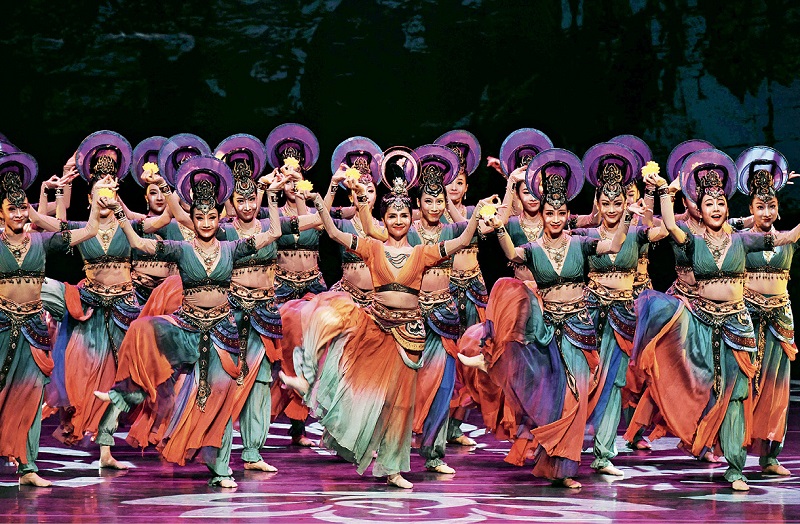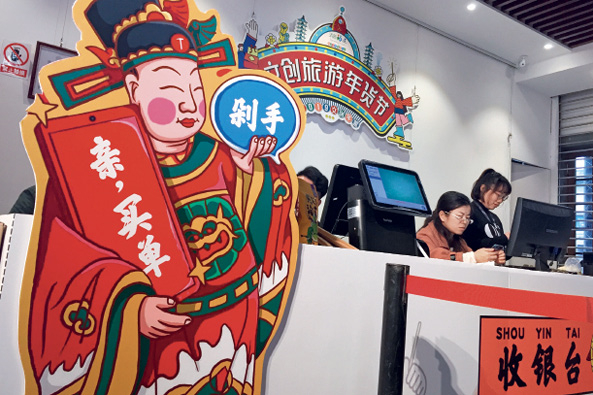In the eyes of young Chinese, fancy designs mixed with elements from traditional Chinese culture are very chic.

Dancers dressed in traditional Chinese attire are playing the role of the famous poetess Li Qingzhao (1084-1155, left) and her servant (right) in the 2023 Wondrous Journey on Qingming Festival presented by Henan Satellite Television.
For visitors attending the first Guochao Art Festival in Beijing Garden Expo Park, there are multiple things that catch their eyes: an interactive drama Monkey King: Hero Is Back for both adults and kids, the blooming flower valley in Yingshan Mountain, and a variety of activities that present a feast blending traditional and modern elements of Chinese culture.
In recent years, with the rise of China chic, Chinese cultural symbols, traditional aesthetics and skills, as well as its cultural industries have become increasingly intertwined together, not only leading a consumption and fashion trend, but also becoming a cultural phenomenon.
Modern Expressions of Traditional Culture
During this year’s Qingming Festival in April, the 2023 Wondrous Journey on Qingming Festival presented by Henan Satellite Television (Henan TV) attracted much public attention.
Among the programs, Beautiful April tells a story of a group of female dancers’ encounter with the classical gardens in Suzhou. Beauty of Luoshui got its inspiration from The Book of Songs, the oldest collection of Chinese poetry. Yizhou Long Song was another dance based on both the Muqam, a traditional art of the Uygur ethnic group of Hami in Xinjiang and the famous painting Court Ladies Preparing Silk of the Tang Dynasty (618-907). Adventures in Early Spring tells an adventure of dancers through the world of ancient paintings.
Through displaying a variety of cultural elements, these shows give audiences a visual feast of oriental aesthetics, and explore new ways of expressing the beauty of traditional Chinese culture.
In the eyes of Li Jianshu, vice president of China Theatre Association and president of Henan Yuju Opera Theatre, the rise of Chinese cultural elements and traditional motifs is a reflection of Chinese people’s growing confidence in their native culture. Besides, he also noted that traditional culture needs new modern ways of expression.
In recent years, multimedia products of dancing with elements from traditional culture have attracted huge online followings. For example, in the dance The Splendid Five Stars from the East, dancers designed their movements based on archaeological pottery figurines and classic paintings. This is in line with the call proposed by President Xi Jinping for making “creative and innovative” literature and art.
Mantingfang · National Colors is positioned as a creative interactive visual program, and its core is a pristine, romantic, and poetic view of nature and life expressed in the movements of five dancers. The innovation and interpretation of traditional art once again reveals the Chinese elegance and charm. As a result, more and more young audiences are realizing that modern works displayed with traditional elements could be very charming.
In daily life, creative products such as ice lollies, refrigerator stickers, and bookmarks, when using elements from cultural icons, like bronze masks of the Sanxingdui Ruins, terracotta warriors, and the bronze galloping horse treading on a flying swallow from the Eastern Han Dynasty (25-220), all make museums popular online.
The action game Genshin Impact, which integrates such characters as Hua Mulan and Mu Gui-ying in classic operas, and uses traditional Chinese instruments like the flute, guzheng, erhu, and pipa, and landscapes in South China, has won praise from both domestic and overseas markets.
The new interpretations of traditional culture have become a means of helping Chinese people inherit their fine culture and a window for foreigners to understand Chinese culture, bringing more vitality to traditional culture.

Dancers standing together during the popular dance The Splendid Five Stars from the East, in which their movements are based on archeological pottery figurines and classic paintings.
 A New Stage for Exhibiting Intangible Cultural Heritage
A New Stage for Exhibiting Intangible Cultural Heritage“An audience of 500 people will be good enough.”
“There should be an audience of 1,000 people. If not, I’ll treat you to a meal.”
This conversation took place during the first live broadcast of Changsha Flower-drum Opera on Douyin. Recalling the story, Wang Yong, director of the Protection and Inheritance Center of Flower-drum Opera in Changsha, said, “We did not know how our first Douyin live streaming would turn out.”
However, the audience who flocked to their broadcast room soon after their premiere offered them the best possible pick-me-up. 500, 1,000...the number of viewers grew quickly, eventually reaching 3.5 million. Changsha Flower-drum Opera became instantly popular, and the Protection and Inheritance Center also became famous.
In fact, Wang is not the first person to try new platforms. Chen Yuqing, a Gen Z young lady in the Flower-drum Opera Troupe, has over 400,000 followers on Douyin. Her performance “Tea Picking” where she is holding four small porcelain cups between her hands and moves the tips of her fingers to make the cups sound like bells, has received 157,000 likes.
The combination of intangible cultural heritage and short video platforms brings new possibilities to the former. According to the 2022 Intangible Cultural Heritage Data Report released by Douyin, over the past year, the total views of videos related to national intangible cultural heritage projects played on Douyin reached 372.6 billion and the videos received 9.4 billion likes. During the past year, the number of live broadcasts of Douyin’s intangible cultural heritage projects increased by 642 percent year-on-year, the average daily broadcasts reached 1,617, and the number of anchors receiving money rewards increased by 427 percent year-on-year. The amount of rewards increased by 533 percent year-on-year. Douyin has become the new stage of many inheritors.
China is extremely rich in intangible cultural heritage resources. Now as traditional intangible cultural heritage is integrated with modern cultural trends, more inheritors are taking the initiative to step into the spotlight. They confidently display their skills, tell stories, introduce their experiences of inheriting traditional culture, and embrace the new stage for the transmission of traditional culture.

New Year’s Shopping Festival is held in Fuzhou City of South China’s Fujian Province from January 12 to 19, 2019, aimed at displaying local cultural brands and driving consumption and tourism.
New Opportunities
“To make the crisp layers, the small dough must leave my hands no more than eight seconds after it is filled. After they are baked, the crust will be as crispy as snowflakes, an effect which cannot be achieved by machines.” Zhang Xiuchen, the third-generation inheritor of Xianghe Bobo (the word in northern Chinese dialects for pastry) explains how jujube paste roll, a traditional Chinese pastry, is made.
“Pastries are the carrier of culture. Bringing our delicious dim sum to more people has been difficult, but Douyin has provided us with this precious opportunity,” said Yang Ming, the fourth-generation inheritor of Xianghe Bobo. According to Yang, the official flagship store of Xianghe Bobo has sold more than 2.1 million products on Douyin since it opened in January 2021. Now the quarterly sales volume is equivalent to that of the past whole year.
Taking advantage of the new opportunities presented by e-commerce, many inheritors are helping old crafts become fashionable goods. At the first “Cultural and Creative Goods Festival · New Year in Museums” of Douyin, the sales volume of cultural and creative products of museums on its e-commerce platform increased by 644 percent month on month. In the “Adventure and Ingenuity” section, which was dedicated to intangible cultural goods, books, agricultural products, and time-honored Chinese brands, the sales volume increased by 301 percent year-on-year. At the “Intangible cultural Heritage Shopping Festival,” inheritors and traditional craftsmen displayed skills and sell cultural heritage products through live streaming and short video. In fact, it is precisely the elements of intangible cultural heritage that make them fashionable in the eyes of consumers.
Guochao has created a new opportunity for the inheritance and development of intangible cultural heritage, and built a bridge to link it with everyday life. Integrating intangible cultural heritage into ordinary people’s life is the best way to protect and inherit it.